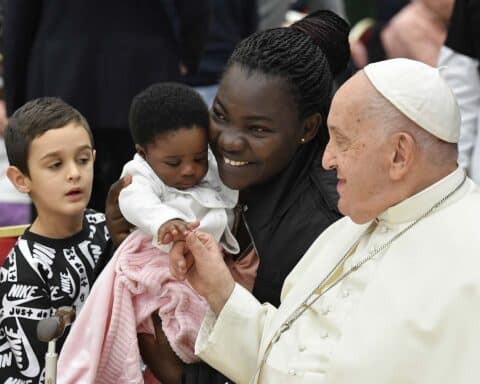
It would also follow that stories of financial scandals within the Church that have broken in recent months have affected giving.
Yet, during this season of Lent, almsgiving is one of the three pillars of the season — a time when, in addition to increased focus on prayer and fasting, we are to extend ourselves financially for the benefit of others. The Catechism of the Catholic Church reminds us, “Giving alms to the poor is a witness to fraternal charity: it is also a work of justice pleasing to God” (No. 2462).
Pope Francis, in his annual Lenten message, stressed the “need to appeal to men and women of goodwill to share, by almsgiving, their goods with those most in need, as a means of personally participating in the building of a better world.”
So, in short, we’re in a time when giving can be a challenge, yet we know we still need to do it. How do we reconcile the two? Here are a few simple ways that make sense to me — and perhaps you’ll have your own suggestions to share, too.
First, if you haven’t been giving to your local parish in recent months, perhaps Lent is a time to intentionally reconsider that gift. You could start by contributing to a special project or charity, and ask that your gift be earmarked for that particular cause. Incorporate prayer into your giving to help discern how your finances might be used in the best way. Talk to your pastor for ways that he can help you feel more at ease with giving to your particular parish; the need is always very great.
Second, consider giving directly to a charity. Or, if you do so already, consider raising the amount of that gift. If you’re concerned about how the money will be used, give locally. Think: a crisis pregnancy center; a homeless shelter; a food bank. There is no shortage of community projects in need of donations, and supporting them can make a tangible and immediate impact.
Third, consider giving of yourself, not just your bank account. Almsgiving during Lent doesn’t have to take the form of a check. Your gift could be in the form of charitable actions, such as volunteering at that crisis pregnancy center, homeless shelter or food bank. Or make serving at a soup kitchen a regular part of your season, perhaps even stretching it beyond just the Lenten season. Works of charity and charitable giving ideally should last all year, not just a season.
In his Lenten message, Pope Francis also said: “Charitable giving makes us more human, whereas hoarding risks making us less human, imprisoned by our own selfishness.”
That concept is one that resonates. When we are generous, we become more human — more able to do what we were created for: love one another. When we hold back our possessions — whether our charitable actions or our charitable giving — we hold back this love. In the constant tug-of-war between ourselves and others that is life, when we are stingy, we pick ourselves every time.
Almsgiving is a muscle that needs to be flexed — a habit that needs to be practiced. Lent is the perfect opportunity to begin.
Gretchen R. Crowe is editorial director for periodicals at OSV. Follow her on Twitter @GretchenOSV.





